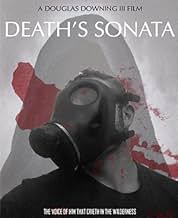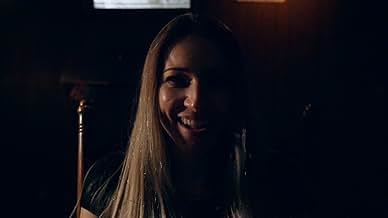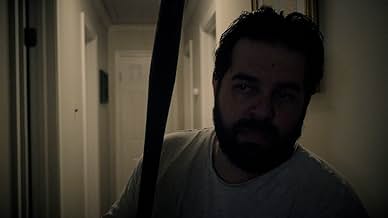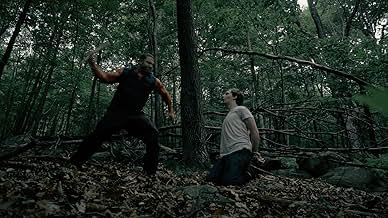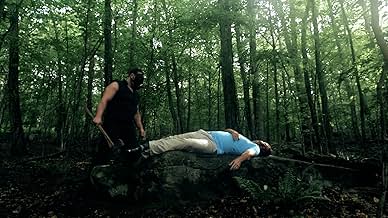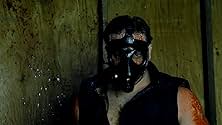Ajouter une intrigue dans votre langueThe story of a man suffering from Schizophrenia and the psychotherapist who tries to find him with the help of his young Bi-Polar patient.The story of a man suffering from Schizophrenia and the psychotherapist who tries to find him with the help of his young Bi-Polar patient.The story of a man suffering from Schizophrenia and the psychotherapist who tries to find him with the help of his young Bi-Polar patient.
- Réalisation
- Scénario
- Casting principal
Dannah Kelly
- Mandy
- (as Dannah Basgall)
Avis à la une
Death's Sonata is a brutal, unsettling indie horror film that leans heavily into psychological breakdown, religious symbolism, and bursts of shocking violence. It's ambitious and often intense, with some genuinely disturbing sequences-but it's also uneven in spots, and that keeps it from fully hitting the mark.
The story centers on Dr. William Fredrickson, a longtime psychotherapist who starts to suspect that his former patient Charles-diagnosed with schizophrenia-is behind a growing string of violent murders. Charles, now living off-grid in a remote hunting cabin, believes the Grim Reaper is speaking to him directly and ordering him to carry out killings. As the bodies pile up, Fredrickson recruits another patient, Matthew, to help track Charles down before the police get to him.
This isn't a slow, moody horror film. It's aggressive and often relentless. The gore is front and center when it hits, and it's not for the faint of heart-some of the kills are nasty, graphic, and deeply uncomfortable. But they're also grounded in the story, not thrown in for shock value. You really feel like you're watching someone unravel-and drag others down with him.
The performances are solid. Charles is played with a disturbing kind of fragility-he's both victim and threat, which keeps the audience unsettled. Fredrickson brings weight to the role of a man carrying guilt and doubt. Matthew adds unpredictability, though some of his arc feels rushed.
The film's biggest strengths are its commitment to tone and its willingness to go dark-really dark. The violence has consequences, the fear is rooted in psychological collapse, and the religious undertones give it an extra layer of unease. But it's not flawless. Some scenes feel choppy, the dialogue can be stiff, and there are moments where the narrative momentum slips.
The story centers on Dr. William Fredrickson, a longtime psychotherapist who starts to suspect that his former patient Charles-diagnosed with schizophrenia-is behind a growing string of violent murders. Charles, now living off-grid in a remote hunting cabin, believes the Grim Reaper is speaking to him directly and ordering him to carry out killings. As the bodies pile up, Fredrickson recruits another patient, Matthew, to help track Charles down before the police get to him.
This isn't a slow, moody horror film. It's aggressive and often relentless. The gore is front and center when it hits, and it's not for the faint of heart-some of the kills are nasty, graphic, and deeply uncomfortable. But they're also grounded in the story, not thrown in for shock value. You really feel like you're watching someone unravel-and drag others down with him.
The performances are solid. Charles is played with a disturbing kind of fragility-he's both victim and threat, which keeps the audience unsettled. Fredrickson brings weight to the role of a man carrying guilt and doubt. Matthew adds unpredictability, though some of his arc feels rushed.
The film's biggest strengths are its commitment to tone and its willingness to go dark-really dark. The violence has consequences, the fear is rooted in psychological collapse, and the religious undertones give it an extra layer of unease. But it's not flawless. Some scenes feel choppy, the dialogue can be stiff, and there are moments where the narrative momentum slips.
This film surprised me. It's flawed, yeah, but when it goes for it-it really goes for it. The violence hits hard, not just for shock value, but because it means something in the story. The payoff in a few of those scenes was brutal in the best way. You feel the weight of it. What holds it back is consistency. Some transitions felt jarring, a few scenes drag, and there are definitely moments where the momentum dips. But it always picks back up, usually with something that punches you in the gut-visually or emotionally. What I appreciated most is that it doesn't hold your hand. It assumes you're paying attention, and it's not afraid to be ugly or uncomfortable. That takes guts. It's not polished, but it's personal. You can feel that.
I had the pleasure of stumbling upon Death's Sonata at the Horrorfest in Stamford, Connecticut, and I can confidently say it's one of the most compelling indie horror films I've seen in years.
Directed by Douglas Downing III, Death's Sonata is a slow-burning nightmare that fuses religious dread, psychological torment, and slasher terror into something wholly its own. From the first unsettling frame to the haunting final shot, the film grips you with a sense of cinematic confidence that's rare in low-budget horror.
The atmosphere is relentless - cold, quiet, and deeply foreboding. The masked killer at the center of the story is iconic in presence, echoing the menace of Michael Myers but layered with something more cultic and metaphysical. The score, sharp and eerie like the title suggests, guides the dread rather than overpowers it, enhancing the tension without feeling cliché.
It blends classic horror aesthetics with modern, grounded violence. There's a maturity to the way the film is paced, building horror through silence, shadow, and suggestion rather than jump scares.
Sure, the budget shows in places, but that's part of the charm. This is grassroots horror done right - gritty, passionate, and unflinching. Death's Sonata proves that indie horror is alive and well!
Directed by Douglas Downing III, Death's Sonata is a slow-burning nightmare that fuses religious dread, psychological torment, and slasher terror into something wholly its own. From the first unsettling frame to the haunting final shot, the film grips you with a sense of cinematic confidence that's rare in low-budget horror.
The atmosphere is relentless - cold, quiet, and deeply foreboding. The masked killer at the center of the story is iconic in presence, echoing the menace of Michael Myers but layered with something more cultic and metaphysical. The score, sharp and eerie like the title suggests, guides the dread rather than overpowers it, enhancing the tension without feeling cliché.
It blends classic horror aesthetics with modern, grounded violence. There's a maturity to the way the film is paced, building horror through silence, shadow, and suggestion rather than jump scares.
Sure, the budget shows in places, but that's part of the charm. This is grassroots horror done right - gritty, passionate, and unflinching. Death's Sonata proves that indie horror is alive and well!
Caught this last week and honestly? It was a bloody good time. Classic low-budget slasher vibes, with a story that actually kept me invested (rare these days). The kills? Creative and satisfyingly gnarly.
Now, about that organ music... at first I thought I'd wandered into a church service by mistake-but weirdly, it grew on me. By the end, it was stuck in my head like a cursed hymn. Kinda love that.
Charles, the main killer, is a surprisingly original character. You don't usually get this much depth in your masked murderers. The dude's clearly unhinged, but I still found myself rooting for him over Matthew and the Doctor. Honestly, those two seemed way more evil. Charles just needed a hug. And maybe therapy. Lots of therapy.
If you're into indie horror with guts (literally and figuratively), give this one a shot. It's rough around the edges in the best possible way.
Now, about that organ music... at first I thought I'd wandered into a church service by mistake-but weirdly, it grew on me. By the end, it was stuck in my head like a cursed hymn. Kinda love that.
Charles, the main killer, is a surprisingly original character. You don't usually get this much depth in your masked murderers. The dude's clearly unhinged, but I still found myself rooting for him over Matthew and the Doctor. Honestly, those two seemed way more evil. Charles just needed a hug. And maybe therapy. Lots of therapy.
If you're into indie horror with guts (literally and figuratively), give this one a shot. It's rough around the edges in the best possible way.
Okay, so I went into Death's Sonata expecting another backyard slasher with a spooky mask and dollar store blood. What I got instead? A gutted hymn of madness that crawled under my skin and stayed there.
Let's talk Charles. He's not your average slasher freak in a mask-he's like if Phantom of the Opera had unresolved trauma, a murder streak, and a funeral playlist stuck on repeat. The guy doesn't stalk... he suffers. And somehow, watching him fall apart while ripping people to shreds feels weirdly tragic. I didn't want to root for him, but halfway through, I was like, "Yeah, stab that guy. He kinda deserves it."
The kills are rough, personal, and almost too close for comfort. No flashy camera spins, no corny one-liners. Just raw violence that feels like it's happening down the block from you. And the score? It's like someone dug up an old church organ, possessed it, and made it weep blood. At first, it's distracting. Then it's unsettling. Then it's perfect.
Is it flawless? Hell no. Some scenes wobble, the budget bleeds through here and there, and a few side characters feel like they wandered in from a community theater production of CSI: Albany. But it never loses that grit. That pulse. That indie horror rage.
Bottom line: Death's Sonata doesn't ask you to like it. It dares you to sit with it. And if you do? You'll leave feeling a little haunted... and maybe a little dirty.
Score: 7.5 out of 10 Watch it if: You like your slashers bruised, bleeding, and barely holding it together.
Avoid it if: You need your horror spoon-fed and squeaky clean.
Let's talk Charles. He's not your average slasher freak in a mask-he's like if Phantom of the Opera had unresolved trauma, a murder streak, and a funeral playlist stuck on repeat. The guy doesn't stalk... he suffers. And somehow, watching him fall apart while ripping people to shreds feels weirdly tragic. I didn't want to root for him, but halfway through, I was like, "Yeah, stab that guy. He kinda deserves it."
The kills are rough, personal, and almost too close for comfort. No flashy camera spins, no corny one-liners. Just raw violence that feels like it's happening down the block from you. And the score? It's like someone dug up an old church organ, possessed it, and made it weep blood. At first, it's distracting. Then it's unsettling. Then it's perfect.
Is it flawless? Hell no. Some scenes wobble, the budget bleeds through here and there, and a few side characters feel like they wandered in from a community theater production of CSI: Albany. But it never loses that grit. That pulse. That indie horror rage.
Bottom line: Death's Sonata doesn't ask you to like it. It dares you to sit with it. And if you do? You'll leave feeling a little haunted... and maybe a little dirty.
Score: 7.5 out of 10 Watch it if: You like your slashers bruised, bleeding, and barely holding it together.
Avoid it if: You need your horror spoon-fed and squeaky clean.
Meilleurs choix
Connectez-vous pour évaluer et suivre la liste de favoris afin de recevoir des recommandations personnalisées
Détails
- Date de sortie
- Pays d’origine
- Sites officiels
- Langue
- Aussi connu sous le nom de
- Соната смерти
- Lieux de tournage
- Société de production
- Voir plus de crédits d'entreprise sur IMDbPro
- Durée
- 1h 43min(103 min)
- Couleur
Contribuer à cette page
Suggérer une modification ou ajouter du contenu manquant


